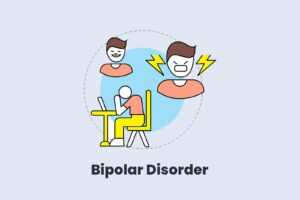Bipolar disorder is a mental illness that can affect anyone, but it is more common in women than in men. If you are a woman and you have been feeling off lately, it is important to be aware of the signs and symptoms of bipolar disorder. In this blog post, we will discuss the most common symptoms of bipolar disorder in women. We will also provide tips on how to address these symptoms and get help if needed.
Contents
What Is Bipolar Disorder?
 Bipolar disorder is described as a mental illness that causes dramatic shifts in a person’s mood, energy, and ability to function. It is also known as manic-depressive disorder. People with bipolar disorder experience high and low moods, or “highs” and “lows.”
Bipolar disorder is described as a mental illness that causes dramatic shifts in a person’s mood, energy, and ability to function. It is also known as manic-depressive disorder. People with bipolar disorder experience high and low moods, or “highs” and “lows.”
These highs and lows are called “mood episodes.” Mood episodes can last for days, weeks, or even months. During a high, or manic, episode, a person may feel unusually happy and energized. They may also act impulsively and make poor decisions.
A low, or depressive, episode is characterized by feelings of sadness and hopelessness. A person may also have low energy and a loss of interest in activities they once enjoyed. It is believed that bipolar disorder in women is often misdiagnosed as depression.
However, it is important to remember that bipolar disorder is a serious mental illness that requires treatment. If you think you may be experiencing symptoms of bipolar disorder, it is important to speak to a mental health professional.
What Are Some Bipolar Symptoms In Women?
When someone is diagnosed with bipolar disorder, it’s important to be aware of the symptoms that come along with this mental illness. Because bipolar disorder is a mental illness that is characterized by extreme changes in mood.
For women, bipolar disorder can be particularly tricky to diagnose. This is because the symptoms of bipolar disorder can often mimic other mental illnesses, such as depression and anxiety. Additionally, many women experience what is known as “rapid cycling,” which means that they experience multiple episodes of mania and depression in a single year.
However, here are a few key symptoms to look out for:
Changes in sleep patterns
This symptom is one of the most common in women with bipolar disorder. You may find yourself sleeping too much or not being able to sleep at all. It might be hard to stick to a regular sleep schedule. For instance, you may find yourself staying up all night and then sleeping during the day.
More often, sleep patterns are a symptom of mania. When you’re in a manic state, you may not feel the need to sleep. This can lead to problems like insomnia. In fact, it is not uncommon for people with bipolar disorder to go without sleep for days at a time.
On the other hand, sleep patterns can also be a symptom of depression. When you’re in a depressive state, you may find yourself sleeping more than usual. This can lead to excessive fatigue and make it hard to concentrate during the day.
Extreme mood swings
Of course, one of the most defining symptoms of bipolar disorder is extreme mood swings. It is not uncommon for people with bipolar disorder to experience mood swings that are so severe they interfere with their ability to function normally on a day-to-day basis. For women with bipolar disorder, these extreme mood swings can be especially debilitating, as they can make it difficult to maintain healthy relationships, perform well at work, and take care of their families.
For instance, a woman with bipolar disorder may be incredibly happy and outgoing one day, and then the next day she may be depressed and withdrawn. These sudden changes in mood can be confusing and frustrating for both the woman experiencing them and her loved ones.
Euphoria
It is not uncommon for people with bipolar disorder to experience periods of extreme happiness or elation. This euphoric state is usually followed by a period of depression. It might seem like a person with bipolar disorder is constantly cycling between these two extremes, but this is not always the case. Some people with bipolar disorder only experience one or two episodes in their lifetime.
However, this euphoric state can also be accompanied by reckless behaviors, such as spending sprees, impulsive sex, and substance abuse. This is why it is important to be aware of the signs and symptoms of bipolar disorder in women.
Increased irritability
Many people with bipolar disorder experience periods of irritability. This can manifest itself in a number of ways, from snapping at loved ones to becoming easily agitated. If you find yourself feeling unusually irritable, take a step back and see if there are any other changes in your mood or behavior that could be contributing to this.
Irritability with women is already a common occurrence due to the vast hormonal changes that women experience throughout their lifetime. However, if you feel like your irritability is out of the ordinary or is impacting your quality of life, it could be a sign of bipolar disorder.
Difficulty concentration
Bipolar symptoms in women are often mistaken for depression because they can be hard to spot. This difficulty concentrating is an especially common symptom in women. It can be hard to focus on anything, make decisions, or remember things. Because of this, women with bipolar disorder may seem disorganized or spacey. If you are having difficulty concentrating, it is important to talk to your doctor about possible causes.
Feeling very sad or empty
 Sometimes, bipolar disorder can cause a person to feel very sad or hopeless. This can last for weeks or longer. The reason behind these feelings may be hard to understand. A person with bipolar disorder may feel this way even when their life is going well.
Sometimes, bipolar disorder can cause a person to feel very sad or hopeless. This can last for weeks or longer. The reason behind these feelings may be hard to understand. A person with bipolar disorder may feel this way even when their life is going well.
For example, a woman with bipolar disorder may feel sad because:
- They’re not doing as well as they’d like to at work
- They’re having problems in their relationships
- They miss a loved one who has died
- A pet has died
- They’ve been diagnosed with a physical illness
Anything can trigger these feelings, and they can be very intense. If you’re feeling this way, it’s important to talk to your doctor or mental health professional. They can help you understand what’s going on and how to manage these symptoms.
Changes in appetite
These are very common bipolar symptoms in women where they tend to either overeat or undereat. This can lead to significant weight gain or weight loss. Also, changes in eating habits can be a sign of mania or hypomania. For example, someone may go on a binge eating spree or they may forego meals altogether.
These changes in eating habits can be very disruptive to one’s life and can cause a lot of distress. So you should pay attention to your eating habits and see if there are any changes that concern you.
Psychosis
It might seem like something out of a movie, but people with bipolar disorder can actually experience psychosis. This can manifest as delusions or hallucinations, and often leads to paranoia. More often, psychosis is characterized by a break from reality. For instance, you might believe that you’re being followed or that someone is out to get you.
You might also have grandiose thoughts, believing you’re more important or powerful than you really are. Psychosis can be very frightening, and it can be difficult to distinguish from reality.
Depression
Of course, bipolar symptoms in women can’t be boiled down to a single emotion. But if there’s one that tends to characterize the low periods of bipolar disorder, it’s depression. Depression can manifest as feelings of hopelessness, helplessness, and worthlessness. You might lose interest in activities you used to enjoy, have trouble concentrating or sleeping, and experience changes in your appetite.
Mania
On the other hand, mania is characterized by an overly elevated mood. You might feel excessively happy or irritable, full of energy, and like you can take on the world. You might also find yourself engaging in risky behaviors, like spending sprees, impulsive sex, or substance abuse. It is also believed that mania in bipolar symptoms can lead to hallucinations or delusions. So you have to be careful not to act on everything you’re feeling.
So these are the top 10 bipolar symptoms in women. People with bipolar disorder experience both ends of the spectrum – they have manic episodes followed by depressive episodes (or a mixed state, which is a combination of both). And it’s important to remember that not everyone experiences the same symptoms.
Some people may only experience one type of episode, while others alternate between the two. And the symptoms can range from mild to severe. If you think you may be experiencing bipolar disorder, it’s important to talk to a doctor or mental health professional. They can help you get the diagnosis and treatment you need.
How Is It Different From Men?
 Generally, bipolar disorder is characterized by extreme mood swings. A person with bipolar disorder may experience periods of depression, followed by periods of mania. However, women with bipolar disorder often experience unique symptoms to men with the condition.
Generally, bipolar disorder is characterized by extreme mood swings. A person with bipolar disorder may experience periods of depression, followed by periods of mania. However, women with bipolar disorder often experience unique symptoms to men with the condition.
For example, women with bipolar disorder are more likely to experience rapid cycling, which means that they experience more than four mood swings within a year. They are also more likely to experience mixed states, which means that they experience symptoms of both mania and depression at the same time.
Women with bipolar disorder are also more likely to experience postpartum depression, which is a form of depression that can occur after childbirth.
On the other hand, a man with bipolar disorder is more likely to experience manic episodes that are characterized by risky behaviors, such as spending sprees or impulsive sexual encounters. And even though women are more likely to experience depression, men with bipolar disorder are more likely to commit suicide.
However, this cannot be said for all women and men with bipolar disorder, as the symptoms will differ from person to person. Therefore, if you think that you or a loved one may be suffering from bipolar disorder, it is important to speak to a mental health professional in order to get a proper diagnosis and tailored treatment plan.
What Triggers Bipolar Symptoms In Women?
There are a number of different factors that can trigger bipolar symptoms in women. These can include:
- Hormonal changes: Bipolar disorder is often linked to changes in hormones. This may be due to the increased levels of estrogen during menstruation, pregnancy, and menopause.
- Stressful life events: Stressful life events, such as the death of a loved one, divorce, or job loss, can trigger bipolar symptoms.
- Substance abuse: Substance abuse, including alcohol and drugs, can trigger manic episodes.
- Genetics: Bipolar disorder is often hereditary, so if you have a family member with the condition, you may be more likely to develop it yourself.
It is believed that a combination of these factors contributes to the development of bipolar disorder. However, the exact cause is unknown. In any way, triggers are important to be aware of so that you can better manage your condition.
How To Manage Bipolar Symptoms In Women?
It becomes crucial to understand how to manage bipolar symptoms in women when we realize that they are twice as likely to develop the disorder than men. While the causes of this remain unknown, we do know that hormones may play a role. So what can women do to mitigate their risk? Let’s discuss a few tips to manage these symptoms efficiently.
Educate yourself
First and foremost, it is important to educate yourself about the signs and symptoms of bipolar disorder. Because symptoms of women can be difficult to understand and at the same time, they can be very subtle. It is not necessary that every woman who experiences mood swings has bipolar disorder. However, if you feel like your mood swings are interfering with your daily life, it is important to reach out to a professional for help.
Track your symptoms
 In addition to learning about the signs and symptoms of bipolar disorder, it’s important to track your own moods and behaviors. This can help you and your doctor or therapist notice patterns and make treatment decisions. There are a few different ways you can do this:
In addition to learning about the signs and symptoms of bipolar disorder, it’s important to track your own moods and behaviors. This can help you and your doctor or therapist notice patterns and make treatment decisions. There are a few different ways you can do this:
- Keep a daily mood chart. Each day, rate your energy level, mood, and how productive you were on a scale of one to ten.
- Write in a journal. Describe your thoughts, feelings, and behaviors each day. You might want to write about any triggers or stressors you experienced that day, too.
- Download a mood tracking app. Some apps allow you to track not only your mood but also how much sleep you’re getting, how much exercise you’re getting, and what you’re eating.
Practice relaxation techniques
It is important to find ways to relax and reduce stress in your life if you are bipolar. One way to do this is through relaxation techniques such as yoga, meditation, and deep breathing exercises. These activities can help you calm your mind and body, which can in turn help reduce the frequency and severity of your symptoms.
It is also important to get regular exercise, as this can help improve your mood and reduce stress levels. try to get at least 30 minutes of moderate exercise each day. This could include walking, biking, swimming, or another activity that you enjoy.
Talk to your loved ones
Talking to your loved ones about your symptoms can be difficult, but it’s important to have support. Your loved ones can provide emotional support and help you make decisions about your treatment. For example, they can help you decide whether to see a mental health professional or go to the hospital.
Also, when you share your feelings with your loved ones, it can help them understand what you’re going through. This can make it easier for them to support you. If you don’t feel comfortable talking to your loved ones about your symptoms, there are other people who can help.
Take some time for yourself
Women usually put everyone’s needs before their own. But when you have bipolar disorder, it’s important to put your own health and well-being first. Make sure to schedule in some “me time” every day, even if it’s just for a few minutes. During this time, you can do something that relaxes or calms you, such as reading, listening to music, or spending time in nature.
It’s also important to get enough sleep. When you’re dealing with bipolar disorder, you may find it hard to fall asleep or stay asleep. This can make your symptoms worse and lead to fatigue. To help improve your sleep, establish a regular sleep schedule, avoid caffeine and alcohol before bed, and create a relaxing bedtime routine.
Eat a healthy diet
 What you eat can affect your mood. Eating nutritious foods helps to keep your energy levels up and stabilizes your mood. Avoid processed foods, sugary drinks, and excessive amounts of caffeine. Instead, focus on eating plenty of fruits, vegetables, and whole grains.
What you eat can affect your mood. Eating nutritious foods helps to keep your energy levels up and stabilizes your mood. Avoid processed foods, sugary drinks, and excessive amounts of caffeine. Instead, focus on eating plenty of fruits, vegetables, and whole grains.
A healthy diet helps your body to function at its best, which can in turn help reduce the symptoms of bipolar disorder. So you should aim to eat a balanced diet and avoid any extreme changes in your eating habits.
Therefore, these are some of the tips to manage bipolar symptoms in women. If you think you may be suffering from bipolar disorder, it’s important to talk to your doctor. They can help you get the diagnosis and treatment you need. With the right support, women with bipolar disorder can lead happy and healthy lives.
Conclusion
To conclude, bipolar symptoms in women are often different from those in men and can be hard to spot. But it is important to be aware of them, as they can have a significant impact on a woman’s life. If you think you or someone you know may be suffering from bipolar disorder, please reach out for help.
There are many resources available to help those struggling with bipolar disorder, and treatment can make a world of difference. It is important to seek professional help if you are experiencing any of the above symptoms. With proper diagnosis and treatment, many people with bipolar disorder go on to lead happy and successful lives.
For more tips and guidance, you can reach out to Therapy Mantra. The team of professional counselors is more than happy to help you in your journey to recovery. Contact us today to learn more about our services. You can also book an online therapy session or download our free Android or iOS app.


